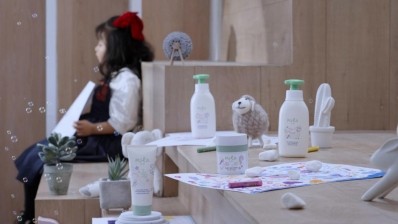Not made for kids: China lawmakers emphasise that make-up is unsuitable for children under three
![China's NMPA emphasise that make-up is unsuitable for children under three. [Getty Images]](/var/wrbm_gb_food_pharma/storage/images/_aliases/wrbm_large/publications/cosmetics/cosmeticsdesign-asia.com/headlines/regulation-safety/china-children-s-cosmetics-regulators-emphasise-that-make-up-is-unsuitable-for-children-under-three/13103591-1-eng-GB/China-children-s-cosmetics-Regulators-emphasise-that-make-up-is-unsuitable-for-children-under-three.jpg)
The National Medical Products Administration (NMPA) has clarified that colour cosmetics are not allowed to be used on children under the age of three in a video report it published on December 14.
According to the NMPA, make-up products that claim to be suitable for children under three are considered illegal.
It reasoned that make-up products present potential risks to children under three.
“The skin barrier function of children under three have not yet matured so they are more sensitive to the effects of external compounds. As such, they are more susceptible to damage.”
Make-up are not toys
Additionally, the NMPA published another video report that warned parents against ‘cosmetic’ items found in toys.
“Right now, cosmetic kit toys for children are hot items in the market. They contain items such as eyeshadows and lipsticks that look very much like cosmetic products. However, these are produced by toy manufacturers and made to be applied on the toy dolls, hence they are not regulated as cosmetics.”
China’s Cosmetics Supervision and Administration Regulation (CSAR) defines cosmetics as “products which can be applied on the outer surface of the human body – skin, hairs, nails, lips – for the purpose of cleaning, protecting, beautifying and grooming, by way of smearing, spraying or other similar means.”
The NMPA emphasised that any make-up item found in toys, including those meant for toy dolls, were not considered cosmetics.
“Cosmetic items found in children’s toys are manufactured according to toys manufacturing standards and giving them to children for use as cosmetics come with a certain level of safety risks,”
It elaborated that cosmetic toys may contain raw materials that are not suitable for use as a cosmetic and can agitate the skin, including heavy metals such as lead.
“Exposure to an excessive amount of lead can cause children serious bodily harm, such as affecting cognitive development.”
The NMPA warned: “If a product meets the definition of cosmetics, whether sold separately or with other items as toys, it would be considered and regulated as a cosmetic product. Make a clear distinction between cosmetic and toys as management measures may vary”
Little Golden Shield
The NMPA has drawn up a new regulatory framework for cosmetics products targeted at children which will come into force on January 1, 2022.
According to the regulations, children’s cosmetics are defined as cosmetics for children aged 12 and under that claim to have functions such as cleansing, moisturising, body refreshing and sun protection.
It would require all cosmetic products meant for children to be labelled with a designated logo.
The logo, which was finalised and published on December 1 and dubbed the ‘Little Golden Shield’.
From May 1, 2022, children cosmetics that apply for registration/notification must be labelled with the logo. For those that have applied for registration/notification before May 1, 2022, the packaging should be updated before May 1, 2023.
![The children’s cosmetics mark, the Little Golden Shield, is not meant to be an assurance of product quality and safety. [Getty Images]](/var/wrbm_gb_food_pharma/storage/images/_aliases/wrbm_medium/publications/cosmetics/cosmeticsdesign-asia.com/article/2022/03/16/china-s-little-golden-shield-not-an-endorsement-of-kids-cosmetics-regulator/13324939-1-eng-GB/China-s-Little-Golden-Shield-not-an-endorsement-of-kids-cosmetics-regulator.jpg)

![Coty is aiming to more than double its sales in China. [Coty / Covergirl]](/var/wrbm_gb_food_pharma/storage/images/_aliases/wrbm_medium/publications/cosmetics/cosmeticsdesign-asia.com/headlines/business-financial/coty-china-aiming-to-more-than-double-sales-over-the-next-three-years/13090715-1-eng-GB/Coty-China-aiming-to-more-than-double-sales-over-the-next-three-years.jpg)

![We round up our most-read stories on the hottest beauty brands. [YSL]](/var/wrbm_gb_food_pharma/storage/images/_aliases/wrbm_tiny/publications/cosmetics/cosmeticsdesign-asia.com/headlines/brand-innovation/brand-updates-from-lg-h-h-ysl-beaute-skinidea-and-more-beauty-brands/17401527-1-eng-GB/Brand-updates-from-LG-H-H-YSL-Beaute-Skinidea-and-more-beauty-brands.jpg)


![Laboratoires Expanscience introduces a ceramide-boosting flaxseed active to cater to trends such as regenerative skin care and supports regenerative agriculture. [Getty Images]](/var/wrbm_gb_food_pharma/storage/images/_aliases/wrbm_tiny/publications/cosmetics/cosmeticsdesign-asia.com/headlines/formulation-science/expanscience-ceramide-boosting-flaxseed-active-taps-into-regenerative-skin-care-trends/17408373-1-eng-GB/Expanscience-ceramide-boosting-flaxseed-active-taps-into-regenerative-skin-care-trends.jpg)

![Estée Lauder will launch new products developed by a local team especially for its Chinese consumers in Q4. [Estée Lauder]](/var/wrbm_gb_food_pharma/storage/images/_aliases/wrbm_tiny/publications/cosmetics/cosmeticsdesign-asia.com/headlines/brand-innovation/estee-lauder-set-to-debut-first-products-developed-by-china-r-d-facility-in-q4/17401473-1-eng-GB/Estee-Lauder-set-to-debut-first-products-developed-by-China-R-D-facility-in-Q4.jpg)
![ESG considerations have emerged as a central focus for China's beauty brands. [Getty Images]](/var/wrbm_gb_food_pharma/storage/images/_aliases/wrbm_tiny/publications/cosmetics/cosmeticsdesign-asia.com/headlines/market-trends/china-s-beauty-brands-embrace-esg-focus-as-consumer-priorities-shift/17304986-1-eng-GB/China-s-beauty-brands-embrace-ESG-focus-as-consumer-priorities-shift.jpg)



